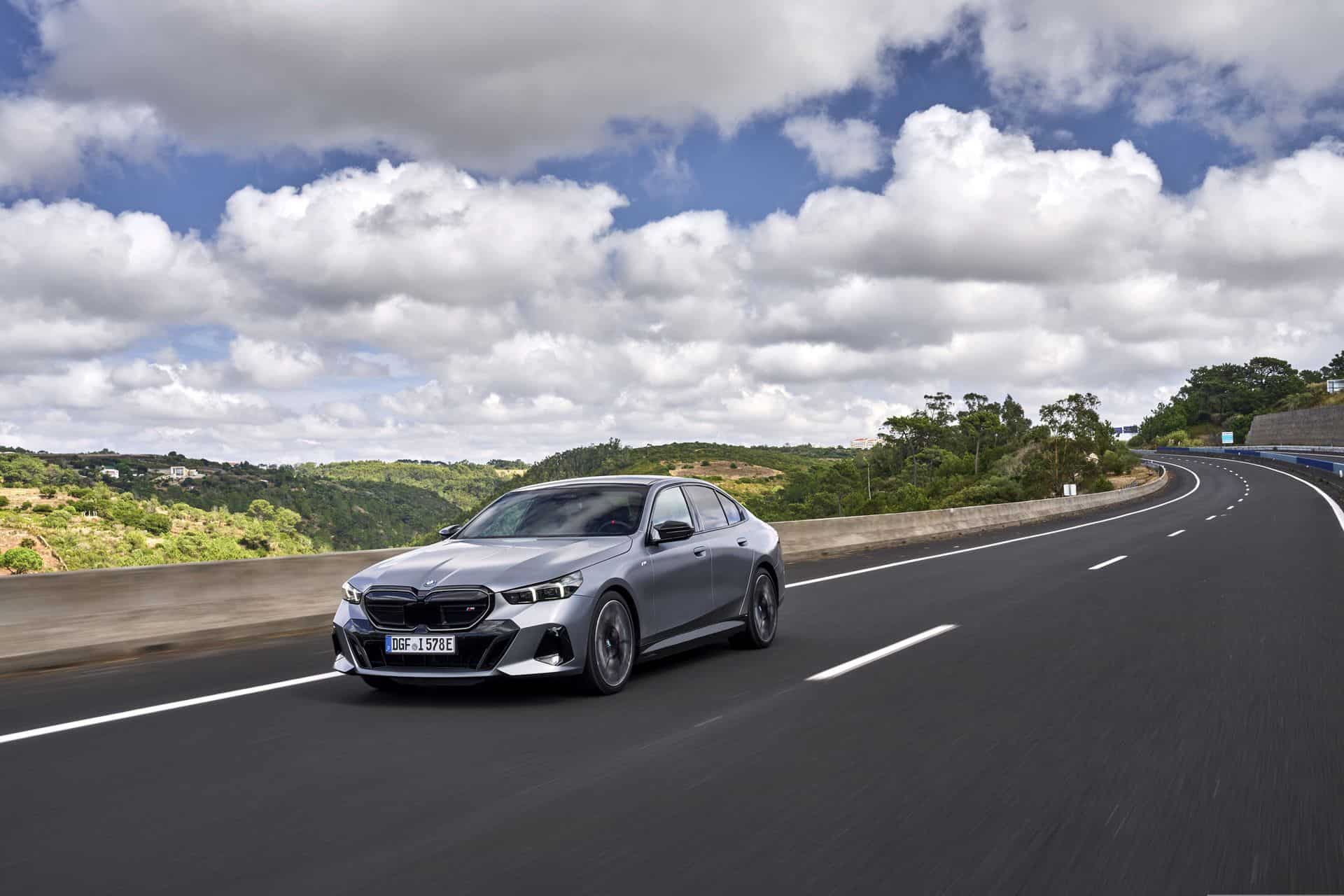How convincing is the electric BMW i5 in practice, especially on long journeys? Is it a real alternative to a high-torque diesel like the BMW 540d xDrive? We conducted a varied practical test over 2,000 miles through half of Europe to evaluate what the top model, BMW i5 M60 xDrive, can do in everyday life—cruising, charging, and performance.
Target Audience: Performance-Loving Customers

The new BMW 5 Series aims to attract performance-loving customers to the electric camp, particularly with the i5 electric version. Since the top speed of the basic BMW i5 eDrive40 model is limited and an all-wheel-drive version has been delayed, choosing the long-distance model is simpler than expected. Until recently, the BMW i5 M60 xDrive was the top model in the 5 Series. However, BMW recently introduced the M5 Hybrid, which boasts a kerb weight of 2.5 tons and a combination of V8 twin-turbo and electric motor with 535 kW / 727 hp / 1,000 Nm, reaching a top speed of 190 mph / 305 km/h, delighting many M-fans even in the basic version.
The current most powerful i5 cannot compete in this power league, but with 442 kW / 601 hp and 820 Nm, drivers behind the leather steering wheel need not worry about lacking sporty performance. Visually, the i5 M60 is restrained for a sports car, despite the slightly modified front end. It lacks flared wheel arches or an extensively modified chassis like the M5. The i5 M60 is the sportiest 5 Series electric version rather than a genuine sports variant.
The European Tour: Route and Experience

The multi-day European tour promises extensive insights into everyday use and long-distance suitability, including cities like Innsbruck, Bolzano, Brescia, Milan, Turin, Grenoble, Clermont-Ferrand, Tour, Le Mans, Paris, Strasbourg, and Stuttgart, starting in Munich. Nearly 2,200 miles / 3,500 kilometers where the electric Bavarian was expected to shine. However, the first disappointment is that the battery, 99% charged, does not show a range over 250 miles / 400 kilometers. The 81.2 kWh battery pack promises a range of 382 kilometers, but this is mediocre for a luxury sedan, especially for a customer accustomed to refueling every 440 miles / 700 kilometers with a BMW 540d xDrive.
Battery Range and Charging Performance

Heading south towards northern Italy, the fast drive on the A99 and A8 towards Innsbruck, combined with a slight energy thirst, necessitates the first charging stop near the German-Austrian border in Kiefersfelden, with the range barely over 200 km. The 600 hp all-wheel drive was far from its top speed, limited early at 143 mph / 230 km/h. Recharging occurs at just under 180 kW, still short of the 205 kW the 400-volt technology allows. BMW models currently lag behind competitors offering 270, 310, or even 400 kW thanks to 800 or 900-volt systems. Nevertheless, the i5’s charging capacity remains high for a long time, and after 30.6 kWh for 24.18 euros, the journey continues towards Brescia. The charging infrastructure in northern Italy is reliable, especially outside vacation periods. In Affi, southeast of Lake Garda, another 75 kWh are refilled after the range drops below ten percent, costing 59.25 euros.
Long-Distance Comfort and Handling

The BMW i5 M60 excels on long journeys. The seats are top-notch, space is ample, and the noise level is low even without insulating glass. The two displays are sharp but could be larger compared to competitors, and there’s no passenger screen. On country roads, the nearly 2.4-ton all-wheel-drive vehicle performs admirably. The precise steering and low center of gravity are pleasing in tight bends, and the brakes transition smoothly from recuperation to disc brakes. Navigation, handling, and comfort in city centers like Milan and Turin are excellent. The car refuels a few kilowatts of power here and there before heading over the Alps towards France. The customs officer at the border tunnel inspects the gray i5 extensively but allows passage.
Charging Experience

The A43 highway on the French side is faster than German highways with fewer roadworks. The switch to France highlights better electromobility infrastructure. Clean, bright, and well-maintained fast chargers are at every service station. The i5 charges efficiently while the driver snacks or relaxes. However, the on-board computer never shows a range of 400 km or more. At the hotel stop in Clermont-Ferrand, the 22 kW charging option at the hotel charges 67 kWh in three hours and eleven minutes for 40.04 euros, providing only 229 miles / 367 km range.
The journey continues to Le Mans, where the BMW i5 M60 performs confidently despite its weight. However, the driver assistance level two / two plus offers limited relief. Hands can only be off the wheel briefly, and looking away triggers warnings. This is understandable but not as beneficial as a level three system.
The return journey from Le Mans to Munich via Paris, Strasbourg, and Stuttgart involves fast driving and heavy rain. The LED headlights are effective, but LED-laserlight would have been better for long-distance night driving. The new 5 Series generation lacks a sunroof, and the hatch remains closed. The comfort level remains high even after 1,500 miles / 2,500 kilometers, with consumption rising from 21.4 to 22.7 kWh per 100 kilometers. Higher speeds on the German highways highlight the limitation of the 190 mph / 230 km/h top speed, while many weaker combustion engines and electric cars are faster.
Conclusion: Is the BMW i5 xDrive M60 a Viable Alternative to Diesel?
Is the BMW i5 M60 xDrive a real alternative to a powerful BMW 5 Series with a combustion engine? For those not driving hundreds of kilometers daily, the switch is worth considering, especially with home charging. Total charging costs for the trip were around 450 euros. However, those who prefer long diesel tours with high real-world speeds and infrequent refueling may stick to diesel engines, which would have been cheaper over the same distance.
[Text and photos: Stefan Grundhoff; press-inform]























































































